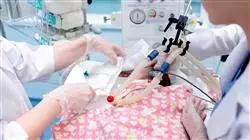University certificate
The world's largest faculty of nursing”
Introduction to the Program
Acquire knowledge on fundamental aspects to improve your treatment of patients with non-malignant hematologies"

Non-malignant hematologic diseases in children are usually described as mild, benign abnormalities with spontaneous resolution in the first weeks of life. Therefore, it is essential to have professionals who are trained in these conditions and can provide the care they require to heal properly. It is also vitally important for nurses to understand that ongoing specialization will help them perform better in an area of work that continues to change and innovate.
Therefore, the Postgraduate diploma in Nursing Care of the Pediatric Patient with Non-malignant Hematologic Pathology provides all the necessary and updated information in this field. In the first module, students will be introduced to the basics of neonatal and pediatric hematology, where they will explore the biological basis of blood diseases in fetuses and neonates. On the other hand, they will contrast normal and abnormal development of children and adolescents for the development of a holistic view of diseases.
Moving forward in the classes, you will learn about the different blood disorders, such as anemia and its different variants. The future graduate will also have the opportunity to learn about the different bleeding disorders in newborns and all the clinical and etiological characteristics that accompany them. Near the end, you will be introduced to the Developmental and Family Centered Care Model, which will help train you to not only treat the patient, but to support family members who are also living with these illnesses.
The teaching team assembled for this University Expert is of recognized prestige and has extensive experience in national and international reference units in the treatment and care of newborns, children and adolescents with hematological disease. The program is 100% online, making it easy for the student to take it conveniently, wherever and whenever he/she wants. All you need is a device with internet access to take your career one step further. A modality according to the current times with all the guarantees to position the engineer in a highly demanded sector.
Know the basics of hemostasis, its control mechanisms and the laboratory tests necessary for its study”
This Postgraduate diploma in Nursing Care of the Pediatric Patient with Non-malignant Hematologic Pathology contains the most complete and updated educational program on the market. The most important features include:
- The development of case studies presented by experts in Pediatric Hematology for Nurses
- The graphic, schematic, and eminently practical contents with which they are created, provide scientific and practical information on the disciplines that are essential for professional practice
- Practical exercises where the self-assessment process can be carried out to improve learning
- Its special emphasis on innovative methodologies
- Theoretical lessons, questions to the expert, debate forums on controversial topics, and individual reflection assignments
- Content that is accessible from any fixed or portable device with an Internet connection
Address the different hematological diseases in newborns, children and adolescents and enhance your professional profile"
The program’s teaching staff includes professionals from sector who contribute their work experience to this training program, as well as renowned specialists from leading societies and prestigious universities.
The multimedia content, developed with the latest educational technology, will provide the professional with situated and contextual learning, i.e., a simulated environment that will provide immersive training programmed to train in real situations.
This program is designed around Problem Based Learning, whereby the professional must try to solve the different professional practice situations that arise during the program. This will be done with the help of an innovative system of interactive videos made by renowned experts.
Learn the Developmental and Family Centered models to provide care centered on the individual and family needs of the patient"

Acquire knowledge on fundamental aspects of diagnostic and follow-up procedures in the newborn with a 100% online program"
Why study at TECH?
TECH is the world’s largest online university. With an impressive catalog of more than 14,000 university programs available in 11 languages, it is positioned as a leader in employability, with a 99% job placement rate. In addition, it relies on an enormous faculty of more than 6,000 professors of the highest international renown.

Study at the world's largest online university and guarantee your professional success. The future starts at TECH”
The world’s best online university according to FORBES
The prestigious Forbes magazine, specialized in business and finance, has highlighted TECH as “the world's best online university” This is what they have recently stated in an article in their digital edition in which they echo the success story of this institution, “thanks to the academic offer it provides, the selection of its teaching staff, and an innovative learning method aimed at educating the professionals of the future”
A revolutionary study method, a cutting-edge faculty and a practical focus: the key to TECH's success.
The most complete study plans on the university scene
TECH offers the most complete study plans on the university scene, with syllabuses that cover fundamental concepts and, at the same time, the main scientific advances in their specific scientific areas. In addition, these programs are continuously being updated to guarantee students the academic vanguard and the most in-demand professional skills. In this way, the university's qualifications provide its graduates with a significant advantage to propel their careers to success.
TECH offers the most comprehensive and intensive study plans on the current university scene.
A world-class teaching staff
TECH's teaching staff is made up of more than 6,000 professors with the highest international recognition. Professors, researchers and top executives of multinational companies, including Isaiah Covington, performance coach of the Boston Celtics; Magda Romanska, principal investigator at Harvard MetaLAB; Ignacio Wistumba, chairman of the department of translational molecular pathology at MD Anderson Cancer Center; and D.W. Pine, creative director of TIME magazine, among others.
Internationally renowned experts, specialized in different branches of Health, Technology, Communication and Business, form part of the TECH faculty.
A unique learning method
TECH is the first university to use Relearning in all its programs. It is the best online learning methodology, accredited with international teaching quality certifications, provided by prestigious educational agencies. In addition, this disruptive educational model is complemented with the “Case Method”, thereby setting up a unique online teaching strategy. Innovative teaching resources are also implemented, including detailed videos, infographics and interactive summaries.
TECH combines Relearning and the Case Method in all its university programs to guarantee excellent theoretical and practical learning, studying whenever and wherever you want.
The world's largest online university
TECH is the world’s largest online university. We are the largest educational institution, with the best and widest online educational catalog, one hundred percent online and covering the vast majority of areas of knowledge. We offer a large selection of our own degrees and accredited online undergraduate and postgraduate degrees. In total, more than 14,000 university degrees, in eleven different languages, make us the largest educational largest in the world.
TECH has the world's most extensive catalog of academic and official programs, available in more than 11 languages.
Google Premier Partner
The American technology giant has awarded TECH the Google Google Premier Partner badge. This award, which is only available to 3% of the world's companies, highlights the efficient, flexible and tailored experience that this university provides to students. The recognition as a Google Premier Partner not only accredits the maximum rigor, performance and investment in TECH's digital infrastructures, but also places this university as one of the world's leading technology companies.
Google has positioned TECH in the top 3% of the world's most important technology companies by awarding it its Google Premier Partner badge.
The official online university of the NBA
TECH is the official online university of the NBA. Thanks to our agreement with the biggest league in basketball, we offer our students exclusive university programs, as well as a wide variety of educational resources focused on the business of the league and other areas of the sports industry. Each program is made up of a uniquely designed syllabus and features exceptional guest hosts: professionals with a distinguished sports background who will offer their expertise on the most relevant topics.
TECH has been selected by the NBA, the world's top basketball league, as its official online university.
The top-rated university by its students
Students have positioned TECH as the world's top-rated university on the main review websites, with a highest rating of 4.9 out of 5, obtained from more than 1,000 reviews. These results consolidate TECH as the benchmark university institution at an international level, reflecting the excellence and positive impact of its educational model.” reflecting the excellence and positive impact of its educational model.”
TECH is the world’s top-rated university by its students.
Leaders in employability
TECH has managed to become the leading university in employability. 99% of its students obtain jobs in the academic field they have studied, within one year of completing any of the university's programs. A similar number achieve immediate career enhancement. All this thanks to a study methodology that bases its effectiveness on the acquisition of practical skills, which are absolutely necessary for professional development.
99% of TECH graduates find a job within a year of completing their studies.
Postgraduate Diploma in Nursing Care of the Pediatric Patient with Non-Malignant Hematologic Pathology
In children, non-malignant hematological diseases are generally pathologies with a spontaneous resolution in the first weeks of life. Thus, it is essential to have trained professionals to provide adequate care and ensure an effective recovery of the youngest. This highlights the relevance of updating in this field for nurses, in order to perform effectively in an area of work that continues to evolve and innovate. Because of this, TECH has created the Postgraduate Diploma in Nursing Care of the Pediatric Patient with Non-Malignant Hematologic Pathology, which provides the most cutting-edge and relevant information on this health branch, ensuring that you will not be left behind with respect to the advances produced in this sector.
Put yourself at the forefront of nursing with this program.
Update your knowledge regarding the care applicable to fetuses with benign blood pathologies or the child with non-physiological neonatal jaundice through the Postgraduate Diploma in Nursing Care of the Pediatric Patient with Non-malignant Hematologic Pathology. All this, following an excellent 100% online methodology that will not only allow you to study from the place you want, but will enable you to combine your professional and personal life with your complete learning.







